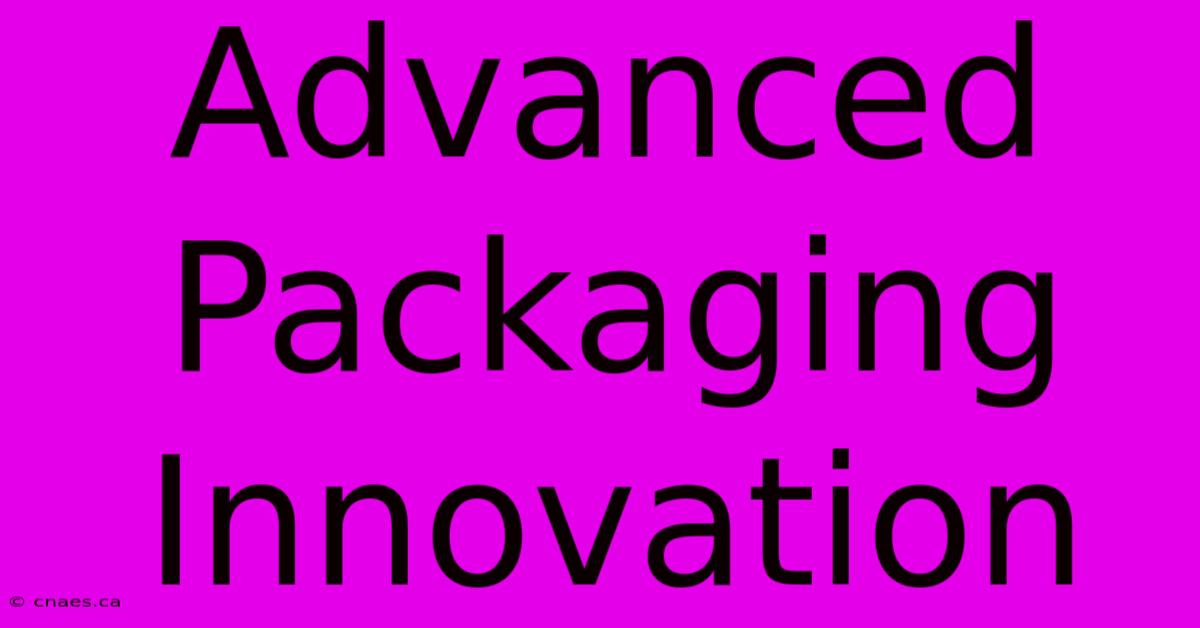Advanced Packaging Innovation

Discover more detailed and exciting information on our website. Click the link below to start your adventure: Visit My Website. Don't miss out!
Table of Contents
Advanced Packaging Innovation: Revolutionizing Electronics
Hey there, tech enthusiasts! Let's dive into the wild world of advanced packaging, a game-changer in the electronics industry. It's not just about slapping chips together anymore; we're talking serious innovation that's pushing the boundaries of what's possible. Think smaller, faster, more powerful devices – that's the promise of advanced packaging.
What is Advanced Packaging? A Simple Explanation
Basically, advanced packaging is all about cleverly connecting different components on a single substrate. Forget bulky, individual chips – we're talking intricate, layered designs that cram tons of functionality into a tiny space. Think of it like building a super-efficient, high-rise apartment building for your electronics.
Beyond the Basics: Exploring Key Innovations
This isn't your grandpappy's packaging. We're talking cutting-edge techniques like:
System-in-Package (SiP):
This is like the ultimate all-in-one solution. Multiple chips, passive components (resistors, capacitors, etc.), and even antennas are integrated into a single package. This simplifies manufacturing, reduces size, and boosts performance – win-win-win! It’s totally awesome for things like smartphones and wearables, where space is at a premium.
3D Packaging:
Imagine stacking chips vertically like pancakes! That's 3D packaging. This dramatically increases density and reduces interconnect lengths, leading to faster processing speeds and lower power consumption. It's a total game-changer for high-performance computing. Seriously, it's mind-blowing how they pull this off.
2.5D/3D Integration:
This involves combining multiple dies (individual chips) using through-silicon vias (TSVs). These tiny vertical connections allow for incredible data transfer speeds between the dies. It's like creating a superhighway for data within the package. This tech is crucial for things like high-bandwidth memory and advanced GPUs.
Fan-out Wafer-Level Packaging (FOWLP):
This technique is all about maximizing the number of input/output (I/O) connections. Imagine a flower blooming – that's kind of what it looks like. The result? Smaller packages, higher I/O counts, and improved signal integrity. It's perfect for high-density applications.
The Impact: Why Should You Care?
So, why should you, the average person, even care about advanced packaging? Because it directly impacts the devices you use every day. Think faster smartphones, longer battery life, more powerful laptops, and even more advanced medical devices. It’s the unsung hero powering the tech revolution!
I remember the frustration of my old phone's slow processor – that's why advanced packaging matters. It's solving problems, making technology better, and ultimately improving our lives.
The Future of Advanced Packaging: What's Next?
The future is bright, folks! Research is constantly pushing the boundaries, exploring new materials and techniques. We can expect even more miniaturization, higher performance, and lower power consumption in the years to come. It's a constantly evolving field, full of exciting possibilities. Hang on tight!
In short: Advanced packaging is more than just a technical advancement; it's the engine driving progress in the electronics world. From the smartphones in our pockets to the supercomputers powering scientific breakthroughs, it's shaping our future, one tiny package at a time. It’s pretty rad, if you ask me!

Thank you for visiting our website wich cover about Advanced Packaging Innovation. We hope the information provided has been useful to you. Feel free to contact us if you have any questions or need further assistance. See you next time and dont miss to bookmark.
Also read the following articles
| Article Title | Date |
|---|---|
| Shearer And Howe Disagree On Newcastle | Dec 01, 2024 |
| Champion Toppo Samantas Acclaim | Dec 01, 2024 |
| Mark Ella 1984 Rugby Genius | Dec 01, 2024 |
| Stream Brentford Vs Leicester Soccer | Dec 01, 2024 |
| Autumn Nations Irelands Clash With Australia | Dec 01, 2024 |
